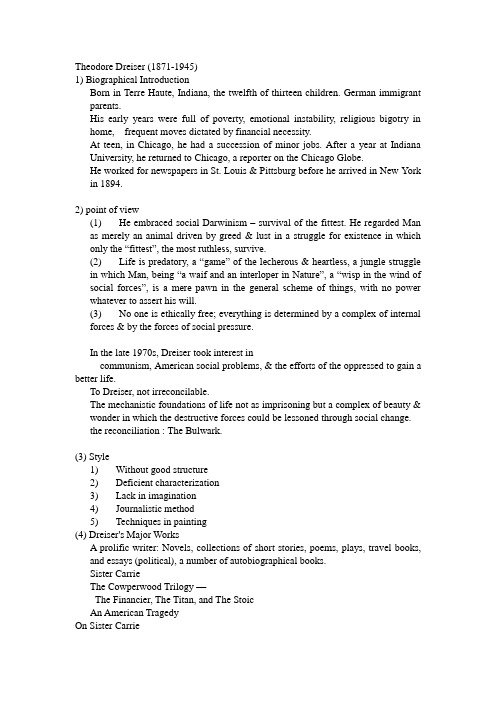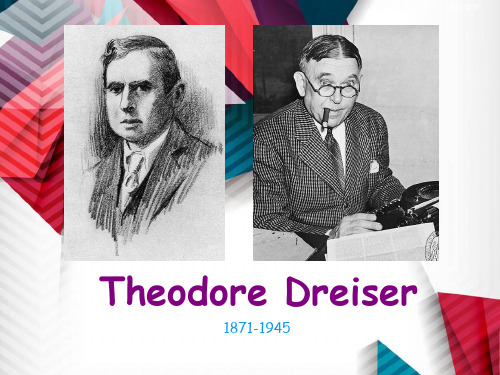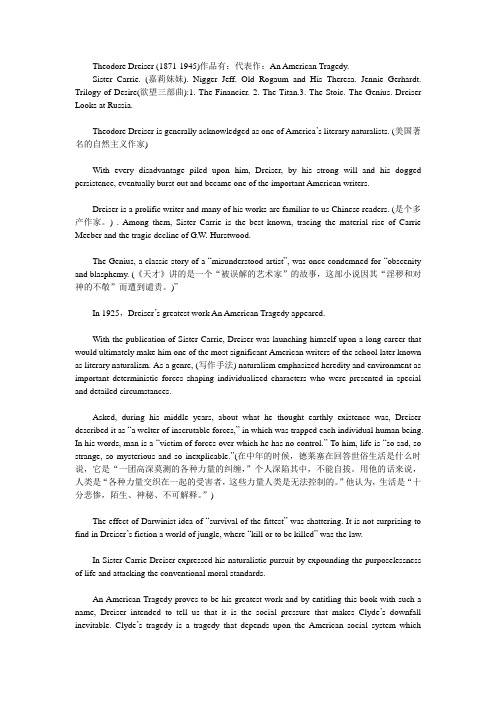Theodore Dreiser
- 格式:doc
- 大小:21.00 KB
- 文档页数:1



Theodore Dreiser (1871-1945)1) Biographical IntroductionBorn in Terre Haute, Indiana, the twelfth of thirteen children. German immigrant parents.His early years were full of poverty, emotional instability, religious bigotry in home, frequent moves dictated by financial necessity.At teen, in Chicago, he had a succession of minor jobs. After a year at Indiana University, he returned to Chicago, a reporter on the Chicago Globe.He worked for newspapers in St. Louis & Pittsburg before he arrived in New York in 1894.2) point of view(1) He embraced social Darwinism – survival of the fittest. He regarded Manas merely an animal driven by greed & lust in a struggle for existence in which only the ―fittest‖, the most ruthless, survive.(2) Life is predatory, a ―game‖ of the lecherous & heartless, a jungle strugglein which Man, being ―a waif and an interloper in Nature‖, a ―wisp in the wind of social forces‖, is a mere pawn in the general scheme of things, with no power whatever to assert his will.(3) No one is ethically free; everything is determined by a complex of internalforces & by the forces of social pressure.In the late 1970s, Dreiser took interest incommunism, American social problems, & the efforts of the oppressed to gain a better life.To Dreiser, not irreconcilable.The mechanistic foundations of life not as imprisoning but a complex of beauty & wonder in which the destructive forces could be lessoned through social change.the reconciliation : The Bulwark.(3) Style1) Without good structure2) Deficient characterization3) Lack in imagination4) Journalistic method5) Techniques in painting(4) Dreiser's Major WorksA prolific writer: Novels, collections of short stories, poems, plays, travel books,and essays (political), a number of autobiographical books.Sister CarrieThe Cowperwood Trilogy —The Financier, The Titan, and The StoicAn American TragedyOn Sister CarrieThe theme of the book:1. The theme in Sister Carrieis materialism. The theme is primarily personified through Carrie with her desire for a fine home, clothes and everything else money can buy.Materialism, including the desire for money, is an important theme in Sister Carrie. The materialism is shown mostly through Carrie's character but also through Hurstwood, a man with a respectable life and money, who still wants more and for that reason commits a crime. The city in itself is also a place of materialism, it is a place that offers all kinds of amusements, pleasures and things to buy, but to participate in what the city has to offer, one has to have money.2. It best embodies Dreiser’s naturalistic belief that men are controlled & conditioned by heredity, environment and chance, only a few extraordinary & unsophisticated human beings refuse to accept their fate wordlessly for their existence.Chicago is the scene of Sister Carrie.Dreiser uses Carrie to express his own longings for wealth, affection for the glitter & excitement of the city, which has come to symbolize the possibility for the realization of the American Dream.―The Magnet Attracting: a Waif amid Forces‖-controlled by two forces:1. internal forces:desires to fulfill American Dream, for social status & material comfort.(e. And yet she was intere sted in her charms…at a woman’s slipper)2. external forces- poverty: attraction of American Dream. (e. ―the magnet attracting city life‖;Carrie’s being attracted by Drouet’s material prospect, entrapped, became his mistress).Carrie is leaving home. This passage is typical Dreiser’s. He gives his thoughts about Carrie & the salesman she meets, and describes them.The first impression is not her opinions but her belongs. At the end of the novel, there is description of her, ends with the exact amount of money she holds. This emphasis on money will be a primary theme throughout the rest the novel. Discussion1. Please make comment on the three main characters.2. Please make comment on the end of the novel and the famous rocking chairsceneThree Main CharactersCarrie: She represents spirit, the longing for a finer & higher form of life, artistic aspiration, imagination, ideals, never be fully attained, without which life is meaningless.She refuses to accept her fate & instead strives unsuccessfully to find meaning & purpose for her existence.Drouet & Hurstwood not as ―saving hands‖;Drouet: an image of a woman pursuer with keen desire for the feminine.(…by an intense desires & admiration for the sex‖)He stands for the material lusts which lies at the bottom of worldly ambition. Hurstwood: A person with no higher goal than the satisfaction of his sensual inclination.3. chance: chance makes her an actress & her successConclusion:To Carrie, the world is cold & harsh, she is alone & helpless. She moves along, driven by desires , catches at any opportunities as first offered by Drouet, then by Hurstwood. A feather in the wind, she was totally at the mercy of forces she can’t comprehend, still less to say control.She just seeks to grasp the mystery of life, and thereby satisfies her desires for social status & material comfort. After a series of incidents & coincidences, Carrrie rises and obtains fame & comfort.The famous rocking chair scene:In spite of her success, she is not happy. She is lonely & dissatisfied. This is a picture of Carrie’s drifting with the tide. She has no control, no freedom of will, but she is not totally despairing, still singing & dancing, looking forward to bright future.. (This is the uniqueness of American naturalism: human impotence & hopelessness but not complete loss of confidence.)。



Theodore Dreiser (1871-1945)作品有:代表作:An American Tragedy.Sister Carrie. (嘉莉妹妹). Nigger Jeff. Old Rogaum and His Theresa. Jennie Gerhardt. Trilogy of Desire(欲望三部曲):1. The Financier. 2. The Titan.3. The Stoic. The Genius. Dreiser Looks at Russia.Theodore Dreiser is generally acknowledged as one of America‘s literary naturalists. (美国著名的自然主义作家)With every disadvantage piled upon him, Dreiser, by his strong will and his dogged persistence, eventually burst out and became one of the important American writers.Dreiser is a prolific writer and many of his works are familiar to us Chinese readers. (是个多产作家。
) . Among them, Sister Carrie is the best known, tracing the material rise of Carrie Meeber and the tragic decline of G.W. Hurstwood.The Genius, a classic story of a ―misunderstood artist‖, was once condemned for ―obscenity and blasphemy. (《天才》讲的是一个“被误解的艺术家”的故事,这部小说因其“淫秽和对神的不敬”而遭到谴责。
Theodore Dreiser (1871-1945)A Short Bio•Birth: extremely poor, intensely religious, big family, German origin.•Education: sponsored by a teacher attending Indiana University.•Work experiences: (Chicago) real estate clerk and collection agent→a newspaper reporter; (NY) a magazine editor & writer→ 1911, a full-time writer.•Political stand: Left-oriented and joined the Communist Party shortly before his death.Literary Career•Major literary genres: short story & novels•Short stories: Free and Other Stories 1918, Chains 1921, Five Furniture 1930•Major novels:•Sister Carrie《嘉莉妹妹》1900 (his 1st novel, withheld for being immoral/for its relentless honesty in presenting the true nature of American→ became famous in the 1920s.);•Jennie Gerhardt《珍妮姑娘》1911;Major Novels•Cowper wood trilogy (“Trilogy of Desire” “欲望三部曲”):•The Financier《金融家》1912, The Titan 《巨人》1914, The Stoic《斯多葛》1917 →Harsh portrait of a type of ruthless businessman like Frank Cowperwood→“Might is right”/the powerful and the ruthless alone survive in this amoral world.•The Genius 《天才》1915 (autobiographical work);•An American Tragedy《美国悲剧》1925 (his masterpiece).Major Features•Determinism & tragic ending:•Characters are unable to assert their will against natural and economic forces.•Hu man tragedy comes as a result of collision between man’s biological needs and society’s ruthless manipulation.•Stubborn honesty: simple but highly moving characters•Natural narrative (ponderous):•massive details;•serious tone: never satirical or comic;•journalistic method of reiterationLiterary Position•“the wheelhouse of American naturalism”•“chief spokesman for the realistic novel”•“a profound and prescient critic of debased American values”Naturalism 自然主义•Background:•Charles Darwin’s On Origin of Species (1859):•The struggle for existence, survival of the fittest, natural selection;•Herbert Spencer’s social Darwinism:•the strongest or fittest should survive and flourish in society, while the weak and unfit would fall victim in the natural course of events to economic forces.• A literary movement that emerged in France, America, and England during the late 19th century and early 20th century and that emphasizes biological and socioeconomic determinism in fiction and drama. •Emergence in Europe: Emile Zola and Thomas Hardy.Major Features•Major characters:•human beings as higher animals whose lives are determined by the laws of heredity and environment and by basic drives over which they have no control: sex, hunger, and fear.•The universe is cold, godless, indifferent and hostile to human desires.•The naturalists’ recurrent concerns: Social systems that destroy and dehumanize; Individual experience of loss and failure.Writing Style•Scientifically accurate; Objective; Truthful in depicting life as a brutal struggle for survival; Factually detailed.Realism vs. Naturalism•Similarities:•Both strive for objectivity; Both are interested in the commonplace in contemporary life. •Differences:•Naturalists d escribe real life in a crude way, the way things really are; they don’t escape into a world of imagination.•Naturalists would go to the slums and write about the life of poverty and crime instead of going to a middle-class neighborhood and writing about middle-class life.•The naturalists’ tone in writing is less serious and less sympathetic but more detached and more pessimistic.Representatives of American Naturalism•Stephen Crane(1871-1900)斯蒂芬·克莱恩:The Red Badge of Courage《红色英勇勋章》•Jack London杰克·伦敦:The Call of the Wild《荒野的呼唤》Martin Eden《马丁·伊登》•Theodore Dreiser•Frank Norris: the Octopus《章鱼》An American TragedyQ: Who are the major characters?Clyde Griffiths –a bellboy in the hotel; Roberta Alden –a working girl at the factory; Sondra Finchley –daughter of a wealthy bossQ: Why is the story not only a tragedy, but also an “American Tragedy”?• A tragedy: A man’s losing struggle against forces that shape human destiny.•Clyde’s life is doomed t o a tragedy. He attempts to break free of the environmental, economic, social, and fatalistic forces but fails. These forces, such as the mental and physical traits that he inherits at birth, the surroundings in which he grows up, the financial status of his family, their lower-class background, and happenstance (the automobile accident, for example), cannot be surpassed by any human being in the world.•An American Tragedy:•The story of An American Tragedy reveals the cultural and moral price of the frenzied drive for wealth and status which is officially encouraged as the realization of the “American Dream”. It is the materialistic society that is as much to blame as the murderer himself.Chapter XLIIWhat happens at the beginning of this episode?What’s the difference between the two letters in terms of their language and the different life they represent? What’s your impression on Sondra and Roberta?What does Clyde feel when both letters reach him?What does he do after reading the letters?What impresses him in the newspaper?What does Clyde feel after reading the news?Chapter XLIIIWhere does Clyde decide to go finally?What attracts Clyde most when he arrives at Twelfth Lake? Could he entertain himself with Sondra freely? Why?What happens in the moon night when Clyde is with Sondra? Do you think Sondra is serious about their relationship?What does Sondra tell Clyde the next morning and what’s her declaration?What does Clyde suggest? What’s Sondra’s reaction?Can you describe Clyde’s response wh en Sondra refuses to elope with him? Does Clyde decide what to do at the end of this chapter?。
Report Of Theodore Dreiser
Theodore Dreiser (1871—1945) who was known as a powerful novelist was born at Terre Haute, Indiana, in1871. He lived in a poor and intensely religious family. And his family was also a big one. There were thirteen children in all and he was next to the youngest. Dreiser attend a number of schools and from 1889 to 1890, he attended Indiana University. But in order to earn a living, he left the university after a year’s hard working.
The early life of Theodore Dreiser was very miserable. He had done a variety of menial jobs, such as washing dishes and clothes for others, working as a real estate clerk and a collection agent. These difficult life experiences provided him many real materials for his works. He became a full-time writer after 1911. And he turned entirely away from fiction toward political activism and polemical writing during the last two decades of his life.
His best works are in the form of short stories and novels. Short stories: Free and Other Stories (1918), Chains (1921), Five Furniture(1930), etc. Novels: Sister Carrie (1900), Jennie Gerhardt (1911), The Titan (1914), Stoic, The Genius (1915), and An American Tragedy (1925).
Theodore Dreiser, as an outstanding representative of naturalism, whose novels depict real-life subjects in a harsh light. In his fiction, Dreiser deals with social problems and with characters who struggle to survive. His principal concern was with conflict between human needs and the demands of society for material success. He showed human beings to have their own will and capacity for realisation of idealism. Theodore Dreiser was considered by many as the leader of Naturalism in American writing. And what’s more, Dreiser was also praised as “the greatest living realist” of the early twentieth century. He was a fine writer of Naturalistic novels.。